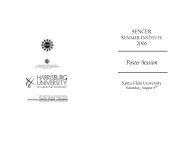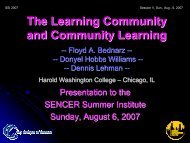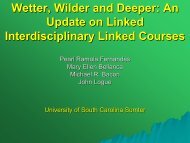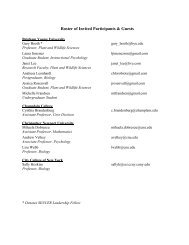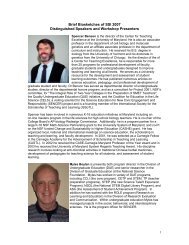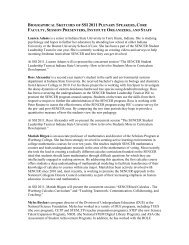Biosketches of invited speakers, Institute facilitators, and ... - SENCER
Biosketches of invited speakers, Institute facilitators, and ... - SENCER
Biosketches of invited speakers, Institute facilitators, and ... - SENCER
You also want an ePaper? Increase the reach of your titles
YUMPU automatically turns print PDFs into web optimized ePapers that Google loves.
Mel earned his bachelor’s <strong>of</strong> science in chemistry at DePaul University <strong>and</strong> his PhD in organic chemistry<br />
at the University <strong>of</strong> California, Berkeley. He has taught at the College <strong>of</strong> William <strong>and</strong> Mary, the<br />
University <strong>of</strong> Utah, <strong>and</strong> the University <strong>of</strong> Delaware during his 41-year career in higher education. He has<br />
served as a department chair, dean, provost <strong>and</strong> acting president at the College <strong>of</strong> William <strong>and</strong> Mary <strong>and</strong><br />
as provost at the University <strong>of</strong> Delaware. Mel has published numerous scientific articles <strong>and</strong> book<br />
chapters as well as written on higher education topics <strong>and</strong> chemical education. The National Science<br />
Foundation <strong>and</strong> the Petroleum Research Fund have supported his research in the mechanisms <strong>of</strong> acidcatalyzed<br />
<strong>and</strong> solvolysis reactions. He retains his longst<strong>and</strong>ing ties with the University <strong>of</strong> Aberdeen,<br />
Scotl<strong>and</strong> as a senior research fellow, is a member <strong>of</strong> the American Chemical Society, the Royal Society <strong>of</strong><br />
Chemistry, London, <strong>and</strong> an elected member <strong>of</strong> the Sigma Xi Scientific Society. He has served as a<br />
member <strong>of</strong> the Board <strong>of</strong> the Medical College <strong>of</strong> Hampton Roads, Virginia <strong>and</strong> as the Chair <strong>of</strong> numerous<br />
accreditation teams for the Southern Association <strong>of</strong> Colleges <strong>and</strong> Schools <strong>and</strong> the Middle States<br />
Association.<br />
Mel will deliver welcoming remarks at SSI 2010.<br />
Patrick Sch<strong>of</strong>f is a research associate for the Natural Resources Research <strong>Institute</strong> at the University <strong>of</strong><br />
Minnesota – Duluth. He also serves as coordinator for the GLISTEN - Duluth/Superior Cluster,<br />
organizing two <strong>and</strong> four-year colleges <strong>and</strong> universities, community-based organizations, <strong>and</strong> informal<br />
science education venues around issues affecting Lake Superior. At SSI 2010, Pat will co-present the<br />
concurrent session “Promoting <strong>SENCER</strong>-Based Approaches to Great Lakes Restoration.”<br />
Additional biographical information was unavailable at the time <strong>of</strong> publication.<br />
Amy Shachter is the associate provost for research initiatives <strong>and</strong> an associate pr<strong>of</strong>essor <strong>of</strong> chemistry at<br />
Santa Clara University. She received her baccalaureate at Knox College <strong>and</strong> earned her PhD in inorganic<br />
chemistry at the University <strong>of</strong> Colorado–Boulder. Her research interests center on porphyrin synthesis.<br />
Her work to improve undergraduate science education has been supported by the Howard Hughes<br />
Medical <strong>Institute</strong>, the National Science Foundation, <strong>and</strong> the Camille <strong>and</strong> Henry Dreyfus Foundation. Amy<br />
serves as the co-director <strong>of</strong> the <strong>SENCER</strong> Center for Innovation–West <strong>and</strong> is a Senior Fellow for the<br />
National Center for Science <strong>and</strong> Civic Engagement.<br />
At SSI 2010, Amy will present a session on “The Basics <strong>of</strong> Community-Based Research.” She will also<br />
co-present a session on “Integrating <strong>SENCER</strong> <strong>and</strong> Sustainability Practices on Campus” <strong>and</strong> be a panelist<br />
on the work sessions “Pedagogy <strong>and</strong> Assessment” <strong>and</strong> “Building a Community <strong>of</strong> Practice.”<br />
Richard D. Sheardy was born in Lake Orion, MI <strong>and</strong> received his bachelor’s <strong>of</strong> science in chemistry<br />
education at Michigan State University. After earning his PhD in organic chemistry at University <strong>of</strong><br />
Florida, he had a post doctoral fellowship in biophysics at University <strong>of</strong> Rochester. He began his<br />
academic career at the Hazleton Campus <strong>of</strong> Penn State University <strong>and</strong> then went to Seton Hall University<br />
where he initiated his research on DNA conformation <strong>and</strong> stability. At Seton Hall, Richard mentored<br />
sixteen PhD students. In 2006, he moved to Texas Woman’s University where he is currently pr<strong>of</strong>essor<br />
<strong>and</strong> chair <strong>of</strong> the department <strong>of</strong> chemistry <strong>and</strong> physics. He teaches freshman chemistry, organic chemistry<br />
<strong>and</strong> biochemistry <strong>and</strong> continues his research focusing on the structure, stability <strong>and</strong> lig<strong>and</strong> binding<br />
properties <strong>of</strong> DNA quadruplexes. He is on the Board <strong>of</strong> Directors for the Calorimetry Conference, is codirector<br />
<strong>of</strong> SCI-Southwest <strong>and</strong> is a <strong>SENCER</strong> Leadership Fellow.<br />
69



